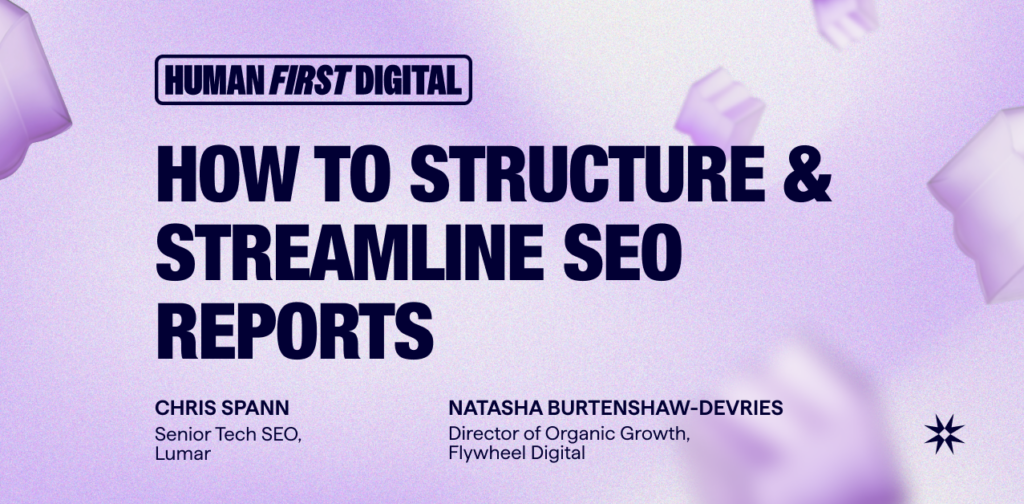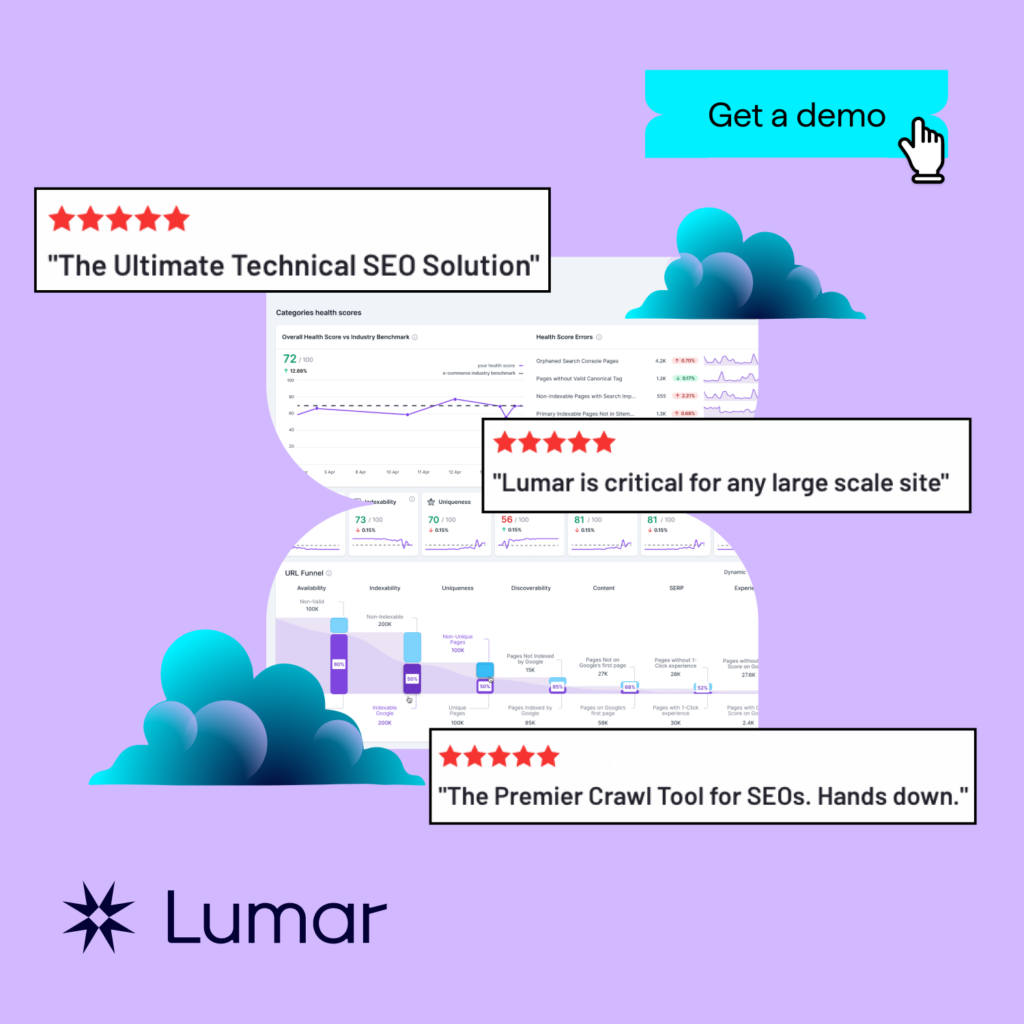On episode 2 of Lumar’s new Human-First Digital podcast, Director of Organic Growth Natasha Burtenshaw-deVries of Flywheel Digital speaks to Senior Technical SEO Chris Spann, of Lumar, about how to create better SEO reports.
Listen to the full interview below, or read on for the top takeaways.
Don’t forget to subscribe to the Human-First Digital podcast on Spotify (or your podcast player of choice) to stay up-to-date with the latest insights and news from the world of SEO and website optimization.
Where to listen/subscribe to the Human-First Digital Podcast
- Listen to HFD on Spotify
- Listen to HFD on Apple Podcasts
- Listen to HFD on Podbean
- Listen to HFD on Amazon Music
- Listen to HFD on Podchaser
Episode timestamps
- 00:00:07 – Introduction to Human First Digital
- 00:03:28 – The Essence of Better SEO Reporting
- 00:08:06 – Understanding Client Needs for SEO Reports
- 00:10:28 – Simplifying SEO Reports for Better Insights
- 00:13:55 – Building Stronger Client Relationships
Episode 2 Recap:

“Today, I’m talking to Natasha Burtenshaw-deVries, the Director of Organic Growth at Flywheel Digital, about her accidental entry into the SEO field and her thoughts on good SEO reporting.”
— Chris Spann, Host of Human-First Digital & Senior Technical SEO at Lumar
[Note: Podcast transcript excerpts may be slightly edited for clarity and context.]
How to build a great SEO reporting framework
Better SEO reporting doesn’t necessarily mean more math, says Burtenshaw-deVries.
If you’re struggling with producing great SEO reports for your company or clients, chances are the problem isn’t with crunching the numbers. First and foremost, you need to get clear on your stakeholders’ goals — and then build the reporting frameworks that can provide the insights they actually care about, week over week.
NATASHA:
Good SEO reporting doesn’t have to be complicated. You don’t necessarily need strong technical skills to do it.
What really makes a good report is being focused on who it’s for, aligning with the right goals.
CHRIS:
In a previous role, when we were shopping for agencies, I was the only tech SEO in the building. We had a lot of site migration stuff going on, so my focus was all on big stuff, what the dev team was doing, so I didn’t have the time to look at the site every day.
One of the main things we said when we were RFPing [SEO agencies] was: I don’t want a 200-page PDF. I won’t read it.
I know what a canonical tag is; tell me which ones are broken. If all you ever give me is Excel sheets, great. I can work with them. I know what I’m doing.
I don’t want you wasting your time — because that’s what it will be — if you make me a nice deck or anything like that; it’ll never get used.
And C-suite people don’t want complicated. Ever. They don’t care about the majority of what you do. What they want is the line with the dollars or pounds next to it to go up and to the right — that’s it. So you can report to them about ‘issues fixed’ or things like that, and they simply don’t want it.
NATASHA:
And it’s tough because part of our job is to educate them about the fact that sometimes they do have to care about the other stuff. I think something I’ve also realized is, like, we call it a report but — especially in the agency world — maybe it’s actually multiple reports.
Maybe you have the report that goes to the C-Suite and you have the one that goes to the marketing manager who you work more closely with.
I was talking about this on the analytics panel this morning — about this idea of KPIs.
There’s not necessarily just one or two KPIs.
A lot of people will say the only KPI you should care about is revenue. And it’s like, yes, but organic traffic matters too!
So, we have the business KPIs and the channel KPIs, and they both matter in their own ways.
Benefits of building simple, structured SEO reports
CHRIS:
If you were to be dropped into a new business tomorrow and they want you to look at their SEO reporting, how would you start trimming the fat, for want of a better way to put it?
NATASHA:
I think the first thing is just asking them what they’re focused on and what they care about. I think it’s important here to recognize that just because the client wants something doesn’t mean that’s what they should be focused on. — But that’s always the first point, just: what are you reporting on? From an agency perspective, as people: what is your boss judging you on? What do you have to do [in your role]?
A lot of my job is just making my client contacts look good — and making their jobs easier. So it’s important to understand their internal reporting contacts and what matters to them. And then I think it’s almost just kind of reverse engineering your way back to: how do we do good reporting on that?
Maybe they just weren’t reporting on certain things before, so you need to pull those numbers. Maybe there are tracking issues that we need to fix.
I know attribution is a big thing that we’re all worried about these days, so sometimes there are issues to fix there.
There’s always that technical component, so start with what they care about, figure out how we get those numbers — and then I think that’s also where there’s room to education them, like: ‘You’re focused on this, but maybe we should also be focused on this as well.’
It’s an always-evolving process.
KPIs always have to evolve, too.
CHRIS:
I love what you said about having to sometime explain to clients why they don’t actually want what they think they do.
Obviously, we’re a big enterprise SEO crawler, right? So we onboard a client and the first thing that they always say is, ‘oh, we want a crawl of everything.’
And immediately, I go: ‘I can almost guarantee you, you don’t. Because we can do a crawl of everything on your website, and 80% of it is not going to be useful to you — I’m going to do it [crawl the entire site] and you’re going to tell me that that part of the website is handled by someone else and you don’t actually have any oversight of certain site sections. So let’s focus on the parts of the website that you actually work on and that you can fix.
If your reports are simple, they aren’t a nightmare to work with.
NATASHA:
There are definitely times where you just got to give the client what they want, but you’re actually a better partner if you don’t always say yes.
One thing we’ve done recently was a big overhaul of the standard reporting templates for our organic team. And a big part of it was just removing so much old crap.
Partially because, with GA4 — I know they’ve made some fixes to the data connector, but there were the query limits and whatnot — and it’s also just like, so much of the stuff in here doesn’t matter.
Those templates were also made at a time when we were working with smaller clients who were much less sophisticated.
So now our clients are asking different questions — we need to show them the data differently.
CHRIS:
We’ve talked a bit about creating better [reporting] lines up to the CEO, etc.
So, what do you find are the other benefits of making these SEO reports simpler?
NATASHA:
We have our Looker Studio, but we also still do some sort of written report.
Because, you know, you can’t just give people numbers. You have to give them insight into it. You have to interpret for them.
A lot of people believe that, you know, the numbers are the truth, they can’t be misinterpreted. But they CAN be misinterpreted, especially with SEO.
So it’s our job to show clients how they should be reading these numbers, what the story they’re telling is.
“You can’t just give people numbers. You have to give them insight into it. You have to interpret for them.”
Natasha Burtenshaw-deVries, Director of Organic Growth, Flywheel Digital
I also find that when my team is compiling these reports, having a really simplified and structured dashboard can really help with that. Obviously, we’re not only pulling from the dashboard — you do still have to use GA4, Search Console, all that. But since we did that overhaul with our dashboards and templates, I’ve definitely found an improvement in people focusing more on the core KPIs; they’re not just getting lost in things that don’t actually matter.
So, [simplifying and properly structuring your SEO dashboards] is important for clients, but even internally, it’s made a big difference in just keeping us focused on what matters most.
CHRIS:
Obviously, being more tech-focused [at Lumar], we end up writing a lot of tickets for developers.
As it’s a very, very similar thing — you sort of have to learn what makes that particular developer or dev team tick so you can provide the correct context, provide actual decent instructions, etc.
We found that when we overall stuff like [SEO reporting templates], and change the format of how we present them with information, it immediately means that we get more out of the relationship. They get more done, and then that means things get renewed, right? And everybody’s happier.
NATASHA:
We don’t do super formal presentations for our reports, but we walk through them with clients and I find the best ones are where it just becomes a conversation. It shouldn’t just be a one-way dump of data and insights. We ask what they are seeing or doing on other channels. It just gives us that bigger understanding and helps us be not just the SEO partner, but helps us be the bigger strategic partner to help them grow their business.
Listen to the full podcast episode to hear Chris and Natasha’s much more detailed conversation — and don’t forget to subscribe on your podcast player of choice to get alerts when our newest episodes go live.
Connect with this episode’s speakers
- Guest: Natasha Burtenshaw-deVries, Director of Organic Growth, Flywheel Digital
- Host: Chris Spann, Senior Technical SEO, Lumar






